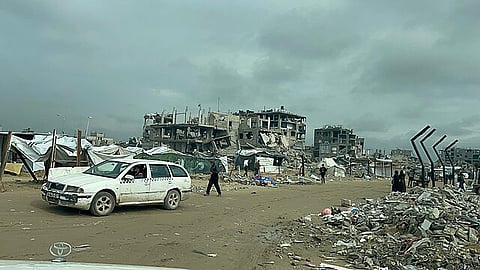

In an extraordinary display of international consensus, 14 of the 15 UN Security Council members, excluding only the United States issued a joint statement condemning Israel’s military expansion in Gaza and officially recognizing the famine devastating the territory as a "man-made crisis" orchestrated by Israeli policies. The statement, delivered by diplomats from Guyana and Slovenia on behalf of nations including France, China, Russia, and the UK, demanded an immediate unconditional ceasefire, the release of all captives, and the full lifting of Israeli aid restrictions that have starved Gaza’s population. The declaration marks the first time the Security Council has collectively endorsed the IPC’s famine classification confirming that 514,000 Palestinians now face catastrophic hunger while explicitly accusing Israel of violating international humanitarian law by using starvation as a weapon of war.
The statement emphasized that Israel’s systematic obstruction of aid despite food and medicine stockpiling at Gaza’s borders constitutes a deliberate strategy to punish civilians, with Guyana’s ambassador Trishala Persaud noting, "This is a man-made crisis. The use of starvation as a weapon of war is clearly prohibited". The IPC report, trusted by all signatory nations, confirms famine conditions in Gaza City are projected to spread to Deir al-Balah and Khan Younis by September, placing 641,000 Palestinians at risk of death by malnutrition. Slovenia’s representative Ondina Blokar Drobic added that Israel’s planned military expansion into Gaza City would "inevitably worsen the horrific humanitarian situation," endangering both civilians and remaining captives.
The United States stood alone in refusing to endorse the statement, with acting ambassador Dorothy Shea dismissing the IPC’s methodology as biased and lacking credibility. This isolation reflects Washington’s ongoing diplomatic protection of Israel, despite overwhelming evidence of war crimes. The statement notably coincided with UK ambassador Barbara Woodward’s separate condemnation of Israel’s famine policies as a "moral outrage," indicating even Washington’s closest allies are breaking ranks over the humanitarian catastrophe. With 313 Palestinians now dead from starvation including 119 children and Israel continuing attacks on aid seekers and hospitals, the US position has become internationally untenable.
The Security Council members invoked Resolution 2417 (2018), which prohibits starvation of civilians as a method of warfare, and called for urgent investigations to hold perpetrators accountable. UN Secretary-General António Guterres earlier emphasized that as the occupying power, Israel has "unequivocal obligations under international law including the duty of ensuring food and medical supplies," while human rights chief Volker Türk stated that deliberate starvation constitutes a war crime. The statement also demanded Israel reverse its decision to approve illegal settlement construction in the West Bank’s E1 area, which would sever Palestinian territorial continuity and eliminate any prospect of a two-state solution.
Most Palestinians oppose disarmament, believing Israel would continue the war regardless, and reject the Palestinian Authority’s legitimacy. The statement’s call for Hamas to release captives aligns with Palestinian desires to end the war, but its demand for disarmament ignores grassroots resistance to external imposition of governance models. As the UN Committee on Palestinian Rights emphasized, the international community has a "legal and moral obligation" to intervene where Israel deliberately starves a population.
The 14-nation consensus reflects shifting global opinion, including growing Western public disapproval of Israel. With US citizens increasingly viewing the war as unimportant to national interests (34% now vs. 65% in 2024), and Trump’s proposal to occupy Gaza opposed by 62% of Americans, diplomatic pressure may force policy changes. The statement concludes by urging all parties to "redouble efforts to secure an immediate ceasefire"; the only path to ending suffering, releasing captives, and building lasting peace. As famine deaths mount hourly, the world’s message to Israel is clear: lift the siege, end the bombing, and let humanity prevail.